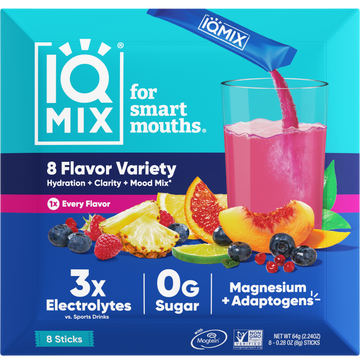Is instant coffee bad for you?
Whether you’re hustling through a busy morning or need a quick caffeine fix during an afternoon slump, a cup of instant coffee can feel like a superhero coming to your rescue.
But every hero’s origin story has a mix of light and shadow to consider. So we’re taking a science-backed look at what makes instant coffee friend or foe.
We’ll explore all the differences between instant and brewed coffee and discuss how to find the healthiest option for your body and brain.
What is Instant Coffee?
Instant coffee is dehydrated brewed coffee that quickly dissolves in water. Just add instant coffee granules to a cup of hot water, stir until they disappear, and sip your way to a quick caffeine buzz.
Unlike brewing fresh coffee from grounds, the process takes less than a minute or two, hence the term “instant.”
How is Instant Coffee Made?
Here’s a snapshot of the instant coffee manufacturing process:
- Harvesting and roasting. Just like any coffee production, specially-selected coffee beans are harvested and roasted.
- Grinding and brewing. The roasted coffee beans are ground to a consistent size and brewed like your standard cup of Joe.
- Concentration and dehydration. Here’s where the magic of instant coffee happens. Removing most of the water content concentrates the brewed coffee. It’s then rapidly dehydrated using either:
- Spray Drying: The concentrated coffee is sprayed into a hot drying chamber. As the fine droplets of coffee connect with the hot air, the water evaporates, leaving behind dry coffee particles.
- Freeze Drying: The concentrated coffee is frozen and then goes into a drying vacuum. This process sublimates the ice directly into vapor, so you wind up with freeze-dried coffee particles.
- Granulation and aroma recovery. Once dehydrated, the coffee extract is blended with a small amount of liquid coffee concentrate to create clumps, which are then dried again.
Manufacturers sometimes re-introduce aromatic compounds that may have gotten lost during the process to retain the coffee’s signature smell and taste when brewed at home by coffee lovers.
What are the Benefits of Instant Coffee?
Going from beans to brew in a blink is just one perk of instant coffee. Other advantages and health benefits include:
Instant Gratification: No Mess, No Fuss
Our world thrives on speed, and over 85% of Americans consume at least one caffeinated beverage daily to keep up.[*]
When time is of the essence, spending one minute making instant coffee is faster than waiting in line at the coffee shop or the Starbucks drive-thru.
It’s also easier and less messy than grinding beans, fiddling with your coffee maker, or cleaning up the grounds from a French press.
A Speedy Caffeine Fix
When it comes to caffeine content, instant coffee generally contains slightly less caffeine than freshly ground coffee beans due to the extraction and dehydration processes.
Depending on the type of coffee bean, roast level, and brewing method, your standard cup of freshly brewed coffee from grounds contains between 70 to 140 milligrams of caffeine. Most instant coffee clocks in around 35 to 90 milligrams of caffeine.
As a nervous system stimulant, caffeine delivers a jolt of energy that helps:[*]
- Lower fatigue and sleepiness
- Increase alertness, concentration, and memory
- Boost mental performance and physical endurance
- Improve moods
Higher brain function and other positive health effects can also be attributed to the fact that instant coffee contains:
More Antioxidants than Regular Brewed Coffee
Bioactive compounds like antioxidants and polyphenols prevent free radicals from forming and destroying our cells.[*][*] They also improve brain health.
Coffee is the most antioxidant-rich beverage, beating out tea and red wine.[*] It provides a significant portion (if not the largest chunk) of our daily antioxidant intake.[*][*]
Thanks to coffee’s caffeine, polyphenols, and chlorogenic acid, coffee drinkers live longer and have reduced risks of:[*][*]
- Type 2 diabetes[*]
- Heart disease[*]
- Certain types of cancer[*]
- Liver disease[*]
- Neuron damage and neurotoxicity[*][*]
- Alzheimer’s, dementia, and Parkinson’s disease[*][*]
Now, there’s a myth that instant coffee contains fewer antioxidants than regular coffee.
But according to research comparing instant, brewed coffee, espresso, and coffee substitutes, instant coffee boasts the highest value of total antioxidant capacity.[*][*]
One study even revealed that the antioxidants in instant coffee specifically protect us from key oxidative stress biomarkers that spell danger for our brains.[*]
Antioxidants are one of the best science-backed brain health supplements; instant coffee now falls on that list.
So When Is Instant Coffee Bad for You?
We’ve outlined the top reasons to swap your regular coffee for instant. But there are cases when instant coffee drinking can be harmful for your health. Look for these red flags before you sip:
It Contains Unhealthy Preservatives, Additives, & Artificial Flavors
Instant coffee from name brands like Nescafe often contains additives to enhance their blend’s flavor, aroma, and solubility. These are the most common you’ll want to avoid:
- Artificial flavoring agents
- Artificial colors (like “caramel color”)
- Emulsifiers like soy lecithin and mono- and diglycerides
- Preservatives to extend shelf life
The fewer unfamiliar or artificial ingredients in your hot brew, the better.
It’s Loaded with Sugar and Creamer
Many flavored instant coffees include added sugar, artificial sweeteners, dried milk solids, and non-dairy creamers. These can turn an innocent cup of Joe into a trap for those on keto diets or watching their blood sugar levels.
Plus, artificial sweeteners may cause gas, bloating, diarrhea, headaches, migraines, overeating, sugar cravings, and other unpleasant side effects.[*][*] And non-dairy creamers contain a slew of artificial ingredients with zero health benefits.
Bottom line? Read ingredient lists carefully.
What About Acrylamide?
Acrylamide is a naturally-occurring compound that forms from sugars and an amino acid (asparagine) during high-temperature cooking processes like frying, baking, and roasting.[*] It’s primarily found in plant-based foods, such as potatoes, grain and cereal products, nuts, and coffee beans.[*] But it’s present in nearly everything cooked above 248°F (120°C).[*]
Dark roasts, such as espresso and French roast coffee beans, tend to contain higher levels of acrylamide because they’re subjected to a longer, hotter roasting process. And instant coffee retains a slightly higher amount of acrylamide than traditional coffee.
Animal studies have shown that exposure to extreme levels of acrylamide may increase the risk of cancer and carry other negative effects.[*] However, the levels of acrylamide we typically consume through food, including coffee, are generally considered low and unlikely to cause significant harm.[*]
Finding the Healthiest Instant Coffee: The IQJOE Advantage
Speed and ease are catapulting instant coffee consumption to popularity. To score the healthiest option, look for instant coffee with:
Only The Good Stuff
The best instant coffee should contain as few ingredients as possible, such as real coffee, natural flavors, and non-synthetic anti-caking ingredients (like silica).
To avoid sabotaging your health or intermittent fasting goals, it should also be free of:
- Sugar
- Gluten
- Dairy
- Soy
- GMO ingredients
🙌 Our vegan, keto-friendly IQJOE instant coffee checks all those boxes (and more!).
Enough Caffeine To Rocket Into Go-Time
The amount of caffeine in instant coffee (35-90 mg) is usually less than what’s found in traditional brews (70-140 mg).
But each IQJOE packet contains 200 mg of caffeine from premium, dark-roasted Brazilian coffee and organic caffeine from green coffee.
Since the FDA says a daily caffeine intake of 400 mg is generally considered safe, you can mix up one packet for the perfect start to your morning and another for your afternoon pick-me-up.[*]
Potent Brain Nutrients: Adaptogens + Nootropics
Adaptogens and nootropics are essential nutrients for a healthy brain and higher mental performance. Adaptogens help you “adapt to” and better manage stress, while nootropics improve your brain power.
So we combined their powers! IQJOE adaptogenic coffee contains a brain nutrient blend of:
The best part? Our noggin-supporting blend takes the edge off caffeine consumption to ensure smooth, steady, jitter-free energy.
☕ Science says Lion’s Mane coffee is the ultimate brain-boosting brew. You in?
Choose Your Caffeine Adventure
So is instant coffee bad for you? It’s not the villain coffee snobs portray it to be. It’s a convenience-packed potion that offers a rapid caffeine fix and more antioxidants than traditional java.
Just read ingredient lists carefully to avoid added sugars, artificial ingredients, and other health saboteurs. Better yet? Go with an instant coffee that fulfills those goals and offers an adaptogenic edge.
Try all four IQJOE flavors (Original Black, Vanilla Spice, Toasted Hazelnut, and Caffè Mocha) with our IQJOE Variety Pack! Snagging one now is much faster than researching others that won’t taste as good or be as good for you. 😎
Written by Lauren Ciccarelli, a writer and research geek passionate about low-carb nutrition, mental health, and meditation. Her 2,500+ articles empower doers with science-backed tips for leveled-up living.





